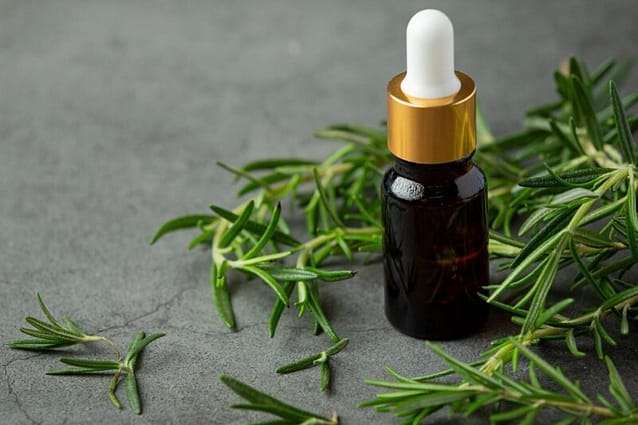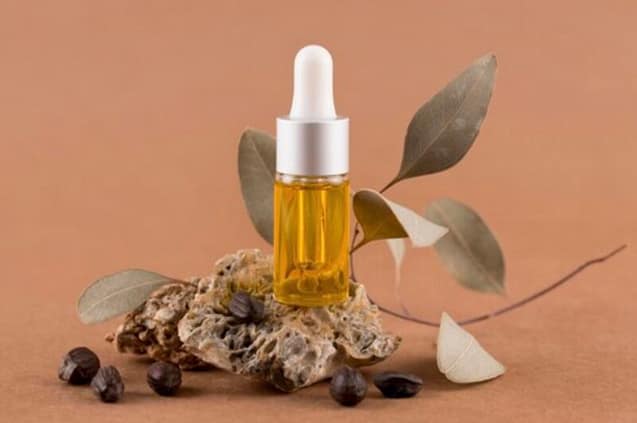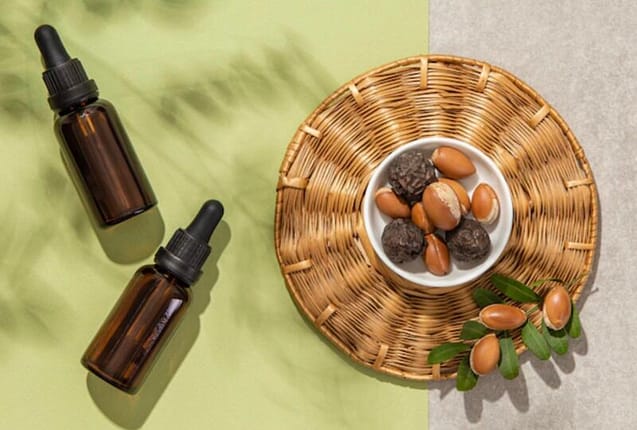Handling skin issues naturally with plant elixirs provides a sustainable remedy. Jojoba balances, rosehip rejuvenates, and tea tree tackles acne. Harness their properties for a holistic approach, promoting radiant and healthier skin.
I. Introduction
In the ever-evolving landscape in skincare, a noteworthy trend has emerged—Handling skin issues naturally with plant elixirs. As awareness grows, so does the demand for natural solutions.
Amid this shift, the importance of utilizing plant-based oil (know more about the benefits of this oil in my blog post) becomes paramount. It offers a seamless blend of nature's potent remedies. These elixirs stand as a holistic answer to common skin concerns.
Join the journey towards healthier, radiant skin by embracing the power of plant-based elixirs.
II. The Power of Plant-Based Elixirs
A. Some key characteristics include:
1. Moisturizing Qualities
Many plant oils are rich in fatty acids, providing hydration and helping to restore the skin's natural moisture balance.
2. Antioxidant Benefits
Plant oils often contain antioxidants that help combat free radicals, protecting the skin from oxidative stress and premature aging.
3. Anti-Inflammatory Effects
Oils such as chamomile and calendula possess anti-inflammatory properties that soothe and calm irritated skin.
4. Regulation of Sebum Production
Contrary to common misconceptions, some plant oils like jojoba can regulate sebum production, making them suitable for dry and oily skin types.
5. Collagen Support
Oils like rosehip are known for promoting collagen production, contributing to skin elasticity, and reducing the appearance of fine lines and wrinkles.
6. Antibacterial and Antimicrobial Properties
Tea tree oil, for example, exhibits antibacterial properties, making it beneficial for addressing acne and other skin blemishes.
7. Vitamins and Nutrients
Plant oils are often rich in vitamins E and C. Also nutrients that promote skin health.
Understanding the unique properties of different plant-based oils allows individuals to choose products that align with their specific skincare needs and concerns.
Understanding the historical significance of elixirs adds mystique to the contemporary use of plant-based elixirs in skincare, connecting us to age-old traditions that sought transformative and healing properties in natural ingredients.
III. Handling Skin Issues Naturally with Plant Elixirs
|
|---|
Understanding the unique properties of different plant oils enables individuals to tailor their skincare routine to address specific skin concerns naturally and holistically.

IV. Spotlight on Key Plant Oils
A. Jojoba Oil: The Balancer
1. Properties
a. Mimics Natural Oils
Jojoba oil closely resembles the skin's natural sebum, making it easily absorbed without clogging pores.
b. Balancing Act
Ideal for all skin types. It helps balance oil production, making it effective for dry and oily skin.
c. Rich in Nutrients
Packed with vitamins E and B-complex. And essential minerals like zinc and copper. These provide nourishment to the skin.
d.Long Shelf Life
Jojoba oil has exceptional stability, resisting rancidity, and can be stored for extended periods without losing efficacy.
e. Non-Comedogenic
Does not cause acne or blackheads, making it a safe choice for those prone to breakouts.
2. Uses
a. Moisturizer
Hydrates the skin deeply, leaving it soft and supple without a greasy feel.
b. Makeup Remover
Effectively dissolves makeup, including stubborn waterproof products.
c. Hair Conditioner
Nourishes the hair and scalp, promoting shine and manageability.
d. Cuticle Oil
Softens and conditions cuticles, promoting healthier nails.
e. Carrier Oil
Perfect base for essential oil blends in aromatherapy or massage.
f. Scalp Treatment
Helps balance sebum production on the scalp, addressing dandruff and dryness.
g. Lip Balm
Soothes and moisturizes chapped lips.
h. Anti-aging Serum
Diminishes the appearance of fine lines and wrinkles, promoting a youthful complexion.
Jojoba oil's versatile properties and wide array of uses make it a staple in skincare and haircare routines, offering a natural and effective solution for various beauty needs.
B. Rosehip Oil: Elixir of Youth
1. Properties
a. Rich in Essential Fatty Acids
Rosehip oil is abundant in omega-3 and omega-6 fatty acids, promoting skin hydration and elasticity.
b. Vitamins A and C
Contains vitamin A, aiding in collagen production, and vitamin C, known for its brightening and antioxidant properties.
c. Antioxidant Powerhouse
Fights free radicals, protecting the skin from premature aging and environmental stressors.
d. Anti-Inflammatory
Reduces inflammation and redness, making it suitable for sensitive and irritated skin.
e. Regenerative Properties
Supports skin regeneration, diminishing the appearance of scars, fine lines, and hyperpigmentation.
f. Lightweight Texture
Absorbs easily into the skin without leaving a greasy residue.
g. Natural Retinoid Alternative
Offers retinol-like benefits without the potential irritation, making it suitable for sensitive skin.
2. Uses
a. Hydration Boost
Provides intense hydration, making it suitable for dry, dehydrated skin.
b. Anti-aging Serum
Diminishes the appearance of fine lines and wrinkles, promoting a youthful complexion.
c. Scar Treatment
Helps fade scars, including surgical and acne scars.
d. Brightening Agent
Evens skin tone and reduces hyperpigmentation for a radiant complexion.
e. Stretch Mark Prevention
Regular application can help prevent and reduce the visibility of stretch marks.
f. Sun Damage Repair
Soothes sun-damaged skin and aids in the repair process.
g. Cuticle Oil
Nourishes and strengthens nails and cuticles.
h. Hair Conditioner
Adds shine and moisture to the hair, combating dryness and frizz.
Incorporating rosehip oil into your skincare routine can harness its powerful properties, offering a natural solution for various skin concerns and promoting overall skin health.
C. Tea Tree Oil: Nature's Potent Healing Elixir
1. Properties
a. Antimicrobial Power
Renowned for its strong antimicrobial and antibacterial properties, making it effective against various skin issues.
b. Anti-Inflammatory
Reduces inflammation and soothes irritated skin, making it suitable for acne-prone and sensitive skin.
c. Clears Blemishes
Known for its ability to combat acne by unclogging pores and controlling excess oil production.
d. Cleansing Agent
Acts as a natural cleanser, removing dirt, makeup, and impurities from the skin.
e. Anti-fungal Properties
Effective against fungal infections, including athlete's foot and nail fungus.
f. Decongested Pores
This helps minimize the appearance of pores, leaving the skin looking smoother and more refined.
g. Fresh and Medicinal Scent
Tea tree oil has a distinct, invigorating aroma that adds a refreshing element to skincare routines.
2. Uses
a. Acne Treatment
Apply directly to blemishes to reduce inflammation and promote healing.
b. Spot Treatment
Dab on insect bites or small cuts to soothe and prevent infection.
c. Scalp Care
Mix with shampoo to alleviate dandruff and support a healthy scalp.
d. Foot Care
Add to foot soaks or creams to combat foot odor and fungal infections.
e. Aromatherapy
Diffuse tea tree oil to create a calming and cleansing atmosphere.
f. DIY Cleaning Products
Incorporate homemade cleaning solutions for their antibacterial properties.
g. Insect Repellent
Dilute and apply to the skin to repel insects naturally.
Tea tree oil's versatility and potent properties make it a valuable addition to skincare and holistic health routines, offering natural solutions for various skin and wellness concerns.

V. DIY Plant-Based Elixirs
A. Simple Recipes for Radiant Skin
1. Nourishing Facial Elixir
Ingredients:
- 1 tablespoon Jojoba oil
- 1 tablespoon Rosehip oil
- 3 drops Lavender essential oil
Instructions:
- Mix all ingredients in a dark glass bottle.
- Apply a few drops to a clean face before bedtime for nourished and rejuvenated skin.
2. Hydrating Hair Elixir
Ingredients:
- 2 tablespoons Argan oil
- 1 tablespoon Coconut oil
- 5 drops Ylang Ylang essential oil
Instructions:
- Combine all oils in a bowl.
- Warm the mixture slightly and massage it into damp hair. Leave for 30 minutes before washing for silky, hydrated locks.
3. Calming Body Elixir
Ingredients:
- 2 tablespoons Sweet Almond oil
- 1 tablespoon Chamomile-infused oil
- 3 drops Frankincense essential oil
Instructions:
- Blend the oils in a container.
- Apply to the body after a shower for a calming and moisturizing effect.
4. Acne-Fighting Spot Treatment
Ingredients:
- 1 teaspoon Tea Tree oil
- 1 teaspoon Jojoba oil
Instructions:
- Mix the oils in a small container.
- Apply a drop to acne-prone areas as a targeted treatment.
5. Revitalizing Lip Elixir
Ingredients:
- 1 tablespoon Coconut oil
- 1 teaspoon Avocado oil
- 1 drop of Peppermint essential oil
Instructions:
- Combine all ingredients in a small jar.
- Apply to lips for a refreshing and moisturizing experience.
Always perform a patch test before applying any new elixir to ensure compatibility with your skin. These simple recipes offer a natural and customizable approach to skincare, promoting a radiant and healthy complexion.
B. Safety Precautions and Tips for Blending Oils
1. Patch Test
Always conduct a patch test before using blended oils to ensure you don't have an allergic reaction.
2. Choose High-Quality Oils
Opt for pure, organic, and high-quality oils to ensure their efficacy and minimize the risk of contaminants.
3. Understand Oil Properties
Familiarize yourself with the properties of each oil, considering factors like comedogenicity, absorption rate, and potential skin sensitivities.
4. Proper Storage
Store your oils in dark glass bottles in a cool, dark place to prevent them from degrading due to exposure to light and heat.
5. Dilution Ratios
Follow recommended dilution ratios, especially when using potent essential oils, to avoid skin irritation.
6. Carrier Oils
When using essential oils, dilute them in carrier oils like jojoba, almond, or coconut oil to reduce the risk of skin irritation.
7. Avoid Sun Exposure
Certain oils, especially citrus essential oils, can increase photosensitivity. Avoid sun exposure after applying such blends.
8. Pregnancy and Medical Conditions
Consult with a healthcare professional, especially during pregnancy or if you have underlying medical conditions, to ensure the safety of specific oils.
9. Allergies and Sensitivities
Be cautious if you have known allergies or sensitivities to certain ingredients, and tailor your blends accordingly.
10. Use Clean Tools
Ensure all tools, bottles, and containers are clean before blending to prevent contamination.
11. Educate Yourself
Educate yourself on the properties and potential interactions of different oils. And create safe and effective blends.
12. Start Small
Begin with small batches when experimenting with new blends to avoid wastage and ensure the blend suits your skin.
13. Keep Records
Keep a record of the blends you create, including ingredients and ratios, to replicate successful formulations and avoid adverse reactions.
Blending oils can be a rewarding and enjoyable process when done safely. By following these precautions and tips, you can create personalized and effective blends while prioritizing the well-being of your skin.
VI. Recommendations for Incorporating Plant-Based Elixirs
A. Start Slow
Introduce one plant-based elixir at a time to observe how your skin responds.
B. Customization is Key
Tailor elixirs to your skin type and specific concerns. Experiment with different combinations.
C. Layering Technique
Apply elixirs in the correct order – lighter oils before heavier ones for optimal absorption.
D. Consistency is Queen
Use plant-based elixirs regularly for sustained benefits. Patience often reveals the true magic.
E. Patch Test Always
Prioritize a patch test to ensure compatibility and avoid potential allergies.
F. Sunscreen Synergy
Combine elixirs with a reliable sunscreen to enhance protection and skincare benefits.
G. Mindful Application
Gently massage elixirs into your skin, fostering a calming self-care routine.
H. Expert Advice
Consult with skincare professionals for personalized guidance, especially if you have specific skin concerns.
Remember, the journey to radiant skin with plant-based elixirs is unique and personal. Find what works best for you and revel in the nourishment nature provides.

VIII. Busting Myths About Plant-Based Skincare
A. Common Misconceptions
1. Myth: Oils cause breakouts.
Fact: Plant oils can balance skin and prevent breakouts.
2. Myth: All oils make skin greasy.
Fact: Lightweight oils like jojoba absorb well, leaving skin nourished without a greasy feel.
3. Myth: Natural means less effective.
Fact: Plant-based elixirs often boast potent antioxidants and nutrients, enhancing skin health.
4. Myth: Oils worsen oily skin.
Fact: Certain oils, like tea tree and jojoba, regulate sebum production, benefiting oily skin.
By debunking these myths, we empower ourselves to embrace the true potential of plant-based elixirs for vibrant and healthy skin. You should read my blog post about the myths and facts of plant-based oil in skincare.
IX. Sustainability and Ethical Sourcing
A. Importance of Ethical Sourcing
1. Environmental Impact
Choosing ethically sourced plant oils minimizes harm to ecosystems, preserving biodiversity.
2. Fair Trade Practices
Ethical sourcing ensures fair compensation for local communities, promoting social responsibility.
3. Quality Assurance
Responsibly sourced oils often adhere to higher quality standards, ensuring purity and potency.
B. Sustainability
- Committed to sustainable practices, sourcing plant oils with a focus on environmental conservation.
- Pioneering fair trade and supporting local communities while delivering top-quality plant-based elixirs.
- Transparent about sourcing practices, emphasizing the ethical journey of each plant oil in their products.
By choosing brands that prioritize sustainability and ethical sourcing, we elevate our skincare routine and contribute to a global commitment to environmental and social well-being.
X. Additional References
- Plant-Derived Antioxidants: Significance in Skin Health and the Ageing Process (2022) https://www.ncbi.nlm.nih.gov/pmc/articles/PMC8776015/
- Anti-Inflammatory and Skin Barrier Repair Effects of Topical Application of Some Plant Oils (2018) https://www.ncbi.nlm.nih.gov/pmc/articles/PMC5796020/
- The Potential of Plant Phenolics in Prevention and Therapy of Skin Disorders (2016) https://www.ncbi.nlm.nih.gov/pmc/articles/PMC4783894/
XI. Conclusion
The significance of handling skin issues naturally with plant elixirs becomes vivid. From exploring the unique properties of oils to crafting DIY elixirs and debunking myths, each step has been a stride toward healthier, radiant skin.
Recapitulating key points, we've uncovered the unparalleled benefits of Jojoba, Rosehip, and Tea Tree oils, witnessed the holistic potential of aloe vera and chamomile, and navigated the essential principles of safe blending. By shedding light on common misconceptions, we've paved the way for evidence-backed truths, empowering you to make informed choices.
I encourage you to embrace the natural remedies offered by plant-based elixirs. Beyond a skincare routine, it's a self-care rooted in nature's wisdom.
May your path be adorned with the glow of healthier, more radiant skin – a testament to the magic of embracing Tackling Common Skin Issues with Plant-Based Elixirs.
XII. My Experience
The journey of handling skin issues naturally with plant elixirs has transformed my skincare routine into a personalized and sustainable ritual. Knowing how to craft DIY plant-based oils tailored to combat different skin concerns has been a revelation.
The convenience of blending Jojoba, Rosehip, and Tea Tree oils for specific needs has empowered me to address my unique skin issues and made my skincare more sustainable. No longer confined to store-bought solutions, I've discovered the joy of creating elixirs that cater precisely to what my skin craves.
The simplicity of the process, combined with the satisfaction of knowing each ingredient's origin and quality, adds a profound layer to my skincare journey. Tackling Common Skin Issues with Plant-Based Elixirs has not just enhanced the health of my skin but has fostered a deeper connection with nature and a more sustainable approach to self-care.
Check out my blog posts about types of toner and natural skin hydration. It will help you complete your skincare routine.
Ready to Transform Your Skincare Journey? Explore My Website!
Embark on a voyage towards radiant and healthier skin by diving into the wealth of natural, vegan, and organic insights. Uncover the magic of Tackling Common Skin Issues with Plant-Based Elixirs and discover a treasure trove of tips and recipes.
Your journey doesn't end here; it's an ongoing exploration, and I'd love to hear about your experiences and discoveries. Connect with me to share your skincare adventures, ask questions, or celebrate the beauty of holistic self-care.
Let's build a community where natural beauty thrives! Explore my other blog posts and join the conversation today.

 Simple. Natural. Better.
Simple. Natural. Better.